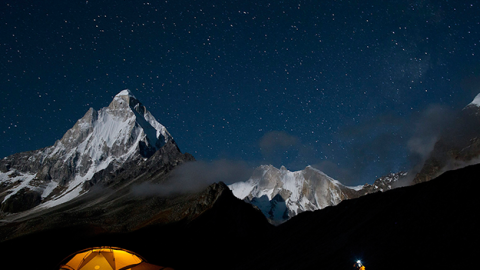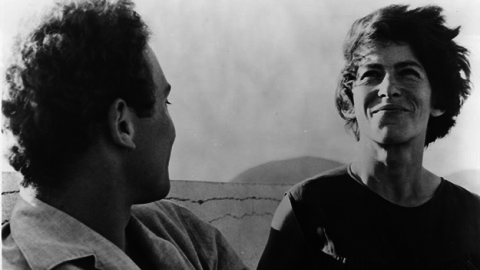Interview: Hubert Sauper
We Come as Friends opens this Friday. The following interview took place after the film’s screenings in New Directors / New Films.
Hubert Sauper is a very charming man. His methods of engagement—eye contact, attentiveness, enthusiasm, easy laughter and self-deprecation—seem genuine, but they’re also invariably useful in his line of work. For Sauper’s two most recent documentaries, the Oscar-nominated Darwin’s Nightmare (04), and We Come as Friends, which screened as part of this year’s New Directors / New Films—the occasion for this New York visit—the 48-year-old filmmaker served as his own cameraman, journalist, pilot, fixer, and ambassador. Flying a small plane he built himself, Sauper literally descended upon villages, agrarian outposts, factories, oil rigs, missionary camps, and UN enclaves in Tanzania and Sudan, and smooth-talked his way into places he didn’t belong.
We Come as Friends, which debuted at Sundance in January and will be released in theaters this fall, is an intently disorienting, kaleidoscopic portrait of South Sudan as it readies for its 2011 split with Sudan proper, which has led to war along the border. “The movie was made because I could foresee the disaster,” he said. “I knew they were going to divide it straight through the oil fields. I knew it was going to burn.”
The following interview took place in the middle of the afternoon in an antiseptic sitting room within the Elinor Bunin Munroe Film Center. But that didn’t stop Sauper from digging in for the long haul, generously sharing a bottle of cognac while talking to his interlocutor about his tactics, his art, and his adventurousness.

In We Come as Friends, you establish the point of view of the film as coming from the eyes of an alien—of your eyes and our eyes as foreign eyes. Which gives things a removed, slightly absurdist, sci-fi feel. Meanwhile you show us locals who are consistently knowledgeable about history—who, unlike us, understand what’s going on. It flies in the face of what we’re trained to expect. Unlike in Darwin’s Nightmare, this time we’re the naïfs.
That’s a good observation, but it’s a documentary and you choose what you want to find. The attitude of colonialists is basically that attitude: “We know and you don’t. We know the future and we will develop them.” I was looking for people who did have a clue. I was looking for people who had a potential revolt in themselves, like the Sudanese woman who sings “My Land,” who studied in America. And I think I just needed to find these people so I wouldn’t freak out. Because if you see how many brainless people there are—it’s unbelievable, seeing such destruction. So when you do meet people who make a point, and know where they’re standing—maybe I was more interested in these people than I was with Darwin’s Nightmare. A lot of people are just involved in it, and they don’t know why.
We are hearing South Sudan is on fire, which is true. And the next line is, why? [Then you’ll hear it’s] because of tribal unrest. The savages are going against each other, and therefore we have to send in more UN peacekeepers, more money to calm them down and feed them, because they’re not able to feed themselves, and all these things. The truth is that these people do not hate the other tribe. It’s the leaders who want to control the oil, to use the tribal aspect to get people to fight. It’s like how Hitler used nationalism and all of Europe in a way, and took people hostage by the idea that we are the French and the others are the others. There is very little tribal hatred until someone says: “They are the others, and they will come and eat us. Here is a gun, go lynch all of them.” Then it’s instinct. Hell breaks loose.
So what do you describe out of this immense possibility? Out of a million people, what do you see? This is the biggest question in making movies. Nothing is sufficient. There is always 99 percent of the picture missing. But I think the most important function of these kinds of films is to [create a] snowball. One person cannot provide all the solutions. We have to share all these questions first.
You’re also not just presenting pieces of information. You’re crafting a work of art, which actually can be much more effective in starting conversations and getting people to look at the situation.
Every scene you see in the film I can talk for three hours about what it is, what’s the context. Let’s take the American Ambassador. He says: “We’re going to bring the light, we’re going to electrify your village.” There is a lot of background I could have put into this scene—that this whole electrical power station is made to prepare future exploitation of gold, because there are gold mines in this village. I was thinking of having people talk about it, and it would have denounced the hypocrisy of the American UNDP, USAid, you know? You would have had more information about it, and you would have been more enraged about a bunch of white people messing up this place, that people are starving to death at this very place while this machine is running. But if I’d started this kind of discourse, I would have had to do it all throughout the film.
So the “alien eyes” approach lets you get away with withholding context?
Yeah, I take out a lot of what was in Darwin’s Nightmare—the denouncing of the scandal, which was not really a unique scandal. To intelligent viewers We Come as Friends is full of things, and to some viewers it’s not enough. I think a lot of people are going to read it differently. They’ll be like, what’s this French guy trying to tell us here? So I have to count on losses, on losing spectators by working along this thin line.
I think we probably agree that you engage someone better if you can provoke their mind into thinking through things, rather than telling them exactly what to think about them.
I think what you really search for, as an artist, is to produce a piece of art or film that makes you experience life. It’s life experience—two hours of pure life. And in life you see a lot of things that don’t have subtitles, and don’t have explanations. You just see them and you don’t see the context, and this whole parcel of it makes you grow up and not be a child anymore, gives you a whole picture of the world. If it does that kind of thing in a concentrated way, in a movie, then I think that is what I’m looking for.

Which relates somewhat to your actual experience there. How much of yourself do you bring to your encounters? Do you ever tell people what you think, your point of view?
All the time, yeah. I’m communicating so much, and it’s basically the key to making people communicate also. I try to explain a lot of things—how we got here, how we built this airplane, what I like, what I’m afraid of. A lot of things.
The plane must be a huge conversation-starter.
Yeah, I get a lot of credit for being like half a genius for having made this primitive, stupid airplane. But it’s really not rocket science.
You are called a madman several times in the film for flying that airplane.
People go: “You can build an airplane?” And it’s really simple actually. It’s a structure that’s been improved for a hundred years. It’s like building a shack in your backyard. You have to respect a few things—you have to use light materials, you have to make sure it’s screwed together. It’s really not so difficult. I got the engine sponsored by a company called Rotax, for Bombardier. It’s built in a little town outside of Strasburg, very close to where Hitler was born, and they build airplane engines for the whole world. They just gave me an engine and said to thank Rotax in the credits. It cost $20,000. Then I went online and found out that this very engine is driving the predator drones. So, if you go to a wedding party and your kids are blown up, it’s powered by this engine. It’s used also for cruise missiles that carry nuclear warheads. Whatever you do, you are part of this mess.
No matter how pure you try to be, you can’t be. Better for you to put that engine to this far better purpose.
That’s what I like to tell myself, but sometimes it’s not [better]. Each one of us finds his or her explanations for whatever we do, and how it couldn’t be done better.
You make some kind of compromise along the way, for the betterment.
Life itself is a huge compromise.

And that goes into whatever decisions you make as a documentary filmmaker. You’re honoring what you see and at the same using footage and people to make grander, abstracted statements. Everything is compromised, but the hope is it’s for a better end.
Yeah, I don’t know. I was at Sundance this year. A very common vein in the Sundance approach to documentary—maybe it’s just the American approach—is to make movies for the better, to make the world a better place. I don’t think this is a good approach. I think it takes art hostage. That we, in a way, are human-rights advocates making art serve our agenda. As an artist, I kind of refuse it. I don’t think it should be so. But the funding system in America is such that [well-intentioned] NGOs want to make the world a better place, and so you make these movies about HIV that basically show how HIV is terrible but here are these good people in the U.S. who are going to make a difference, and if you just donate here it’s going to happen. It’s hijacking art, you know? And a lot of artists maybe have to accept it, because it’s a good way to get money.
But I think more filmmakers are subverting this, finding a way of arguing that their film does serve these goals in order to get the funding, but then make a film that is more interesting in the end. To get the funding you need but also make the work of art that you want.
I was at the UN headquarters this morning, talking to the UN head of communications worldwide about how the UN is now helping filmmakers. But it naturally leads to a good image for the UN. It’s a bit problematic. I don’t want to oppose it frontally because I think a lot of great people found this kind of niche to make films happen. But maybe this is not very sustainable for an art form. I’m still in a good position, because in Europe I get money from the European Union. They give me maybe 200,000 euros [to make We Come As Friends]. I had just made Darwin’s Nightmare, which made the European Union look terrible, so a lot of people in the European Union were going after me, trying to stop it. But still the European Union is capable of understanding that it needs internal critique, and they gave me money for my next movie.
In the U.S. it is probably not like this, so I feel privileged for it. It’s extraordinary when someone gives you a couple hundred thousand dollars and says, “Come back in five years with a movie.” How many people can do that [these days]? If you work for The New York Times, they send you with like $15,000 to the Sudan, you come back in two weeks and end up on two pages. What can you do? Not much, you know. And if his or her opinion is too much off the main thinking of the paper or TV station, it’s just not going to happen. But I can do it. So I feel like it’s the last niche of free speech, of totally free speech.
Which is afforded by having the budget and the freedom to move.
Afforded by the budget and by the form. I get to be in the position of court jester in a way. And I’m an artist who gets to do what I think is relevant, and I say it in a way that I think is relevant.

Are you shooting all the time?
Ninety percent of the time. Except when I’m myself in the frame, you can see it’s my pilot that shot.
So upon arriving places you’ve got the camera out?
Yeah, a tiny camera. Sometimes you’ve got two little cameras. I shot some of it with my iPhone, out of the airplane.
You actually held it outside of the plane?
Yeah, and you can see two people in the cockpit. It’s like a selfie. How else can you film it? It’s my face in the wind.
Weren’t you detained for a couple months in Libya?
Yeah, they wouldn’t let me go. But I wasn’t in prison. They said you’re grounded, here’s a room, you’re being fed and that’s it. I was like: “Can I make phone calls? Use the Internet?” No. I’m going into worlds that I hate most—you know, these universal military uniforms, order, Christianity, this colonial madness. When I was in it, when I couldn’t go here or had to stay there—it drove me half crazy. I had to tell myself over and over that no one asked me to go there. That I had to carry the consequences. I couldn’t blame my mother you know? She didn’t send me there.
I would imagine it would be difficult to spend that much time with some of these people. Clearly your being a pilot made it easier for you to consort with the Russian pilots in Darwin’s Nightmare. Yet as horrifying as those scenes can be, you also obtain a slight contrition, some knowledge that things are kind of fucked up. Getting that from these apparent meatheads winds up being that much more valuable.
I agree, yeah. As a filmmaker you have to predict or pre-empt the itinerary of the soul of a spectator. In Darwin’s Nightmare, I completely knew that when I opened the film with these brutes [manhandling] this poor, beautiful girl, you’re basically outraged but also comfortable. Because you are very sure you were never like that. So you’re the good guy.

Your horror comes from a place of privileged distance.
But then I always try to break that comfort by saying: “Well, he’s not as stupid as you think.” And then you’re out of your comfort zone and that provokes your intelligence, like The Act of Killing. That film fucked with your mind, and that’s why it’s so great, why it’s a pure work of art and important. It should have won the Oscar. But it’s also okay and normal that some people passionately dislike the movie.
And you’ve made a film that people may not know what to make of either. There’s a more surrealistic quality to We Come as Friends that’s a bit of a departure—an abstract quality to the way that certain sequences are shot and edited, the filtering in of music. Was it about your development as an artist, or was it more appropriate to the Sudanese context?
The more abstract thing was a desire to go away from what I did before, away from the denunciation of “Look at how bad this is.” I mean, one thing that I would never do again, which I did in Darwin’s Nightmare, was this piece where a factory owner was interviewed who was obviously very ignorant and didn’t know what was happening with his fish in Europe and just wanted to make money. I asked him at one point: “How many people do you think in Europe can eat from one planeload of your fish?” And he says: “I have no idea.” And I knew he wouldn’t have any idea. Then I put the title card in that says, “Me, Hubert, I know it, but he doesn’t know shit.” Basically it puts me above the subject and I think that was a mistake.
You went away from title cards altogether. Would you even ask that question now?
Maybe not. But also I’ve found that visual literacy has really improved, that people are more and more able to watch documentaries with more subtle ways of talking about things, and that this improvement is a consequence of films that pushed the boundaries. It’s like an educating dialogue, a way to talk about things. It’s much more accepted, this more lyrical, more poetic approach to things. Because the word documentary is an ugly word—a document that is obviously true or is the law, that has to inform people. Which by the way is an imperialistic tool because it documents the Other for the purpose of the powerful. The first explorers who went into the Himalayas and Africa came back with drawings sometimes. You know, this is the way people live over there. Once you know how they live, you can fuck them over. Once you know what kinds of weapons they use, well, let’s get these machine guns and blow them away.
You introduce this anthropological angle, alighting on this strange land with your aircraft, but you invert it consistently.
One thing that I also have to come to terms with is that a very, very clear element of going to the Other’s territory is about adventure. I read somewhere a definition of what adventure is: “Leaving your known space, going to unknown lands, and creating a kingdom.” Which is, by definition, colonization. Adventure is a very colonialist concept. We are children of all these people who wanted to go to the moon and the North Pole and take over India. We wanted to do it and I am completely one of these people. [Laughs] I want to go to strange planets and find out what’s going on there. But behind me are a billion tourists on cruise ships looking to “Discover the Caribbean.”

Not visit, “discover.”
Yeah, to go and meet the Other, meet the locals. It’s all of these things. Tourism is the multiplied perversion of the mindset of the first explorers. That’s what it is. The Nile is the best example: penetrate the Nile, go up the Nile to take the treasures away.
The treasures are always there to be found.
One trillion have been there and they still suggest that you’re the first person there on that beach. You discovered it. You discovered Africa in the footsteps of Agatha Christie and all of this. It’s like a big joke.
But you say that you’re guilty of that to some degree, of that impulse?
I don’t want to be in the footsteps of them but I want to be in a place where no one has been. One of the most evil explorers and murderers, Captain James Cook, when he discovered Australia for the Queen, he killed off 100,000 aborigines almost single-handedly. He wrote in his logbook when he went into the Pacific, that “We are going into a space where no man has ever been before.” This line was taken as the opening for the spaceship Enterprise. What’s the name of the captain of the spaceship Enterprise?
Kirk.
Captain James Kirk. [Laughs] That’s him. It’s a reincarnation. He goes to different planets and he meets the Others, other civilizations, and he encounters dangers and all these clichés. Of course I was playing with these clichés with this plane, but also I am one of these people, and I do want to figure out what’s going on. I was not bored on that trip, I can tell you that.
But the treasures you’re after are quite different.
But there were moments when I remember thinking, “What the fuck am I doing here?” When we filmed the [American Christian] missionaries, I was at a point of total despair. These guys plowed into these villages because they were kind of at home, because these were their savages to whom they distributed these white socks.
Blaring white tennis socks on otherwise naked black children.
People thought we were also missionaries, but you can’t say: “I’m not a missionary, I’m a nice guy.” Because I’m not—I’m the same, with the same kind of face.







